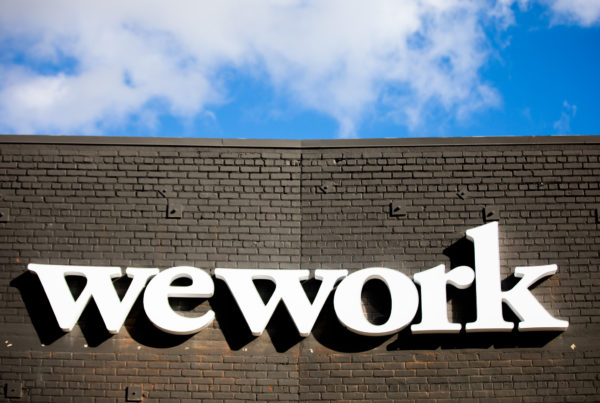Nepotism, the practice of giving family and friends preferential treatment for jobs and opportunities, is almost universally viewed unfavorably.
The practice is synonymous with privilege and denying outsiders opportunity, but economist Allison Schrager offers up a different view.
In a recent column for Bloomberg, she takes a different view, calling it “efficient transfer of valuable human capital” and arguing that nepotism actually offers many benefits to the economy. She joined the Texas Standard to discuss.
This transcript has been edited lightly for clarity:
Texas Standard: You argue that nepotism has a bad rap. Tell us a little bit about this hashtag that you reference in your piece: #nepobaby. What’s that about?
Allison Schrager: Well, it’s often trending on TikTok. Usually it’s about celebrities. I think we all can think of a lot of famous movie stars who it turns out their parents are also in the business, like Gwyneth Paltrow or Dakota Johnson. So it’s these very visible sources of nepotism where there’s a lot of wealth at stake and usually not a lot of jobs to be had that upsets people the most.
The conventional wisdom here, if you talk to H.R. experts and that sort of thing, is that when you have a workplace situation where there’s this perceived favoritism of a relative, it reduces morale. Employees may have less incentive to perform their responsibilities if they think that the path to promotion is undermined by nepotism. Isn’t there a patent lack of fairness inherent when it comes to nepotism?
Yeah, it often feels that way. But as I explain, you know, there are some benefits to nepotism, mainly that, you know, what some people call nepotism, an economist might call an efficient, an early transfer of human capital. So human capital is the skills you have in the job. Also, maybe even the enthusiasm you have for a job. And, you know, actually, most nepotism that goes on or you see someone working the same company as their father or mother actually tends to be in things like construction and manufacturing. That not only is because your parent gave you a leg up, but also because even as a child, you know, you see them talking about their job. So you learn things about it. And also there’s a sense of pride that comes from doing what your parent did.
The reason I thought about this is when I wrote my first book, I interviewed people in a lot of really weird professions like paparazzi and horse breeding and surfing and all these things. And I was always surprised. The first thing you ask is, how did you ever get into this job? And they always would say how their family started it. And there was just such a great sense of pride in stories about being a child and starting to do the work. And that also means that you’re getting this sort of early on-the-job training. So sometimes, you know, if you have a job because your parent had it, that means you’ll also be better at it.
But at the same time, I mean, you think about the lack of representation among many minorities, for instance, in the workplace. And when you have people in power tending to be from groups of people who have at least historically enjoyed privileges that have been taken for granted by so many people for so long, isn’t nepotism the enemy of a more diverse workplace?
It can be, but the economy is not zero sum. So I think instead of saying, you know, nepotism is bad, we should think about, you know, this human capital that get transferred early. How can we also get the human capital to people who don’t have that advantage? And I think there’s some interesting research going on now that even exposure to a family, you know, that has a desirable job can really change your outlook and give you some of that human capital. And as I said, I think we need to think more about growing the economy so there’s just not such a short supply of good jobs. So if they only go to people who have that leg up, it doesn’t just feel like it just goes to them.
Is there a way – and I don’t know if you’re arguing for this – that companies and institutions can ensure the effective transfer of human capital, so you have that efficiency factor that you’re referring to, but without engaging in nepotism or blatant favoritism? I mean, are you making the case that there should be more nepotism, for example, or that policies against nepotism are misguided?
I think the policies against it are misguided. I don’t think we need to to go out and look for people who have or run a family business. But I also think the downside effects that you talk about are going to become less of a problem. I mean, for instance, you know, we all don’t want to work with someone who got a job at the company because their father worked there, and then they just like, don’t do any work and they’re terrible at it. That’s very disheartening and kills morale.
But jobs are getting so much better at moderating how good a worker [people] are, how productive they are. And, you know, as long as they’re free to fire these people, if they’re not standing up to the job and not doing well, then sort of the downsides will be less apparent. And in fact, we’ll get more of the good stuff and less of the bad stuff. Also, another reason people got these jobs often is it was hard to find people, you know, search is expensive. But with the Internet, it’s also easier to find people. So one person is super qualified, one is a little less, but they have that family knowledge, then they might be sort of less likely to be hired in the future.
What sort of reaction have you received from this piece?
You know, mostly positive – people who are saying, you know, yeah, I’m in the same business as my father and it really makes me feel good. And I shouldn’t have to feel bad about that. And they shouldn’t.














